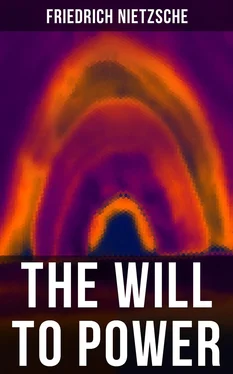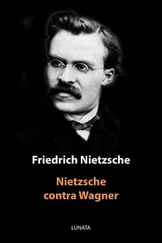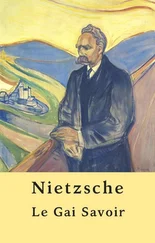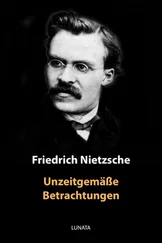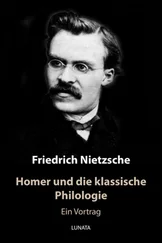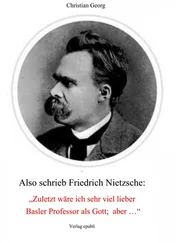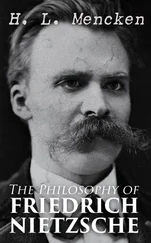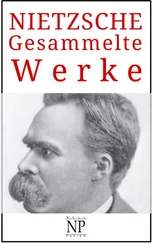All the practices of private orders, of solitary philosophers, and of fakirs, are suggested by a correct consideration of the fact, that a certain kind of man is most useful to himself when he hinders his own action as much as possible.
Relieving measures : absolute obedience, mechanical activity, total isolation from men and things that might exact immediate decisions and actions.
46.
Weakness of Will : this is a fable that can lead astray. For there is no will, consequently neither a strong nor a weak one. The multiplicity and disintegration of the instincts, the want of system in their relationship, constitute what is known as a "weak will"; their co-ordination, under the government of one individual among them, results in a "strong will"—in the first case vacillation and a lack of equilibrium is noticeable: in the second, precision and definite direction.
47.
That which is inherited is not illness, but a predisposition to illness : a lack of the powers of resistance against injurious external influences, etc. etc, broken powers of resistance; expressed morally: resignation and humility in the presence of the enemy.
I have often wondered whether it would not be possible to class all the highest values of the philosophies, moralities, and religions which have been devised hitherto, with the values of the feeble, the insane and the neurasthenic in a milder form, they present the same evils.
The value of all morbid conditions consists in the fact that they magnify certain normal phenomena which are difficult to discern in normal conditions....
Health and illness are not essentially different, as the ancient doctors believed and as a few practitioners still believe to-day. They cannot be imagined as two distinct principles or entities which fight for the living organism and make it their battlefield. That is nonsense and mere idle gossip, which no longer holds water. As a matter of fact, there is only a difference of degree between these two living conditions: exaggeration, want of proportion, want of harmony among the normal phenomena, constitute the morbid state (Claude Bernard).
Just as "evil" may be regarded as exaggeration, discord, and want of proportion, so can "good" be regarded as a sort of protective diet against the danger of exaggeration, discord, and want of proportion.
Hereditary weakness as a dominant feeling: the cause of the prevailing values.
N.B. —Weakness is in demand—why?... mostly because people cannot be anything else than weak.
Weakening considered a duty : The weakening of the desires, of the feelings of pleasure and of pain, of the will to power, of the will to pride, to property and to more property; weakening in the form of humility; weakening in the form of a belief; weakening in the form of repugnance and shame in the presence of all that is natural—in the form of a denial of life, in the form of illness and chronic feebleness; weakening in the form of a refusal to take revenge, to offer resistance, to become an enemy, and to show anger.
Blunders in the treatment: there is no attempt at combating weakness by means of any fortifying system; but by a sort of justification consisting of moralising; i.e., by means of interpretation.
Two totally different conditions are confused : for instance, the repose of strength, which is essentially abstinence from reaction (the prototype of the gods whom nothing moves), and the peace of exhaustion, rigidity to the point of anæsthesia. All these philosophic and ascetic modes of procedure aspire to the second state, but actually pretend to attain to the first ... for they ascribe to the condition they have reached the attributes that would be in keeping only with a divine state.
48.
The most dangerous misunderstanding. —There is one concept which apparently allows of no confusion or ambiguity, and that is the concept exhaustion. Exhaustion may be acquired or inherited—in any case it alters the aspect and value of things.
Unlike him who involuntarily gives of the superabundance which he both feels and represents, to the things about him, and who sees them fuller, mightier, and more pregnant with promises,—who, in fact, can bestow,—the exhausted one belittles and disfigures everything he sees—he impoverishes its worth: he is detrimental....
No mistake seems possible in this matter: and yet history discloses the terrible fact, that the exhausted have always been confounded with those with the most abundant resources, and the latter with the most detrimental.
The pauper in vitality, the feeble one, impoverishes even life: the wealthy man, in vital powers, enriches it. The first is the parasite of the second: the second is a bestower of his abundance. How is confusion possible?
When he who was exhausted came forth with the bearing of a very active and energetic man (when degeneration implied a certain excess of spiritual and nervous discharge), he was mistaken for the wealthy man. He inspired terror. The cult of the madman is also always the cult of him who is rich in vitality, and who is a powerful man. The fanatic, the one possessed, the religious epileptic, all eccentric creatures have been regarded as the highest types of power: as divine.
This kind of strength which inspires terror seemed to be, above all, divine: this was the starting-point of authority; here wisdom was interpreted, hearkened to, and sought. Out of this there was developed, everywhere almost, a will to "deify," i.e., to a typical degeneration of spirit, body, and nerves: an attempt to discover the road to this higher form of being. To make oneself ill or mad, to provoke the symptoms of serious disorder—was called getting stronger, becoming more superhuman, more terrible and more wise. People thought they would thus attain to such wealth of power, that they would be able to dispense it. Wheresoever there have been prayers, some one has been sought who had something to give away.
What led astray, here, was the experience of intoxication. This increases the feeling of power to the highest degree, therefore, to the mind of the ingenuous, it is power. On the highest altar of power the most intoxicated man must stand, the ecstatic. (There are two causes of intoxication : superabundant life, and a condition of morbid nutrition of the brain.)
49.
Acquired, not inherited exhaustion: (1) inadequate nourishment, often the result of ignorance concerning diet, as, for instance, in the case of scholars; (2) erotic precocity: the damnation more especially of the youth of France—Parisian youths, above all, who are already dirtied and ruined when they step out of their lycées into the world, and who cannot break the chains of despicable tendencies; ironical and scornful towards themselves—galley-slaves despite all their refinement (moreover, in the majority of cases, already a symptom of racial and family decadence, as all hypersensitiveness is; and examples of the infection of environment: to be influenced by one's environment is also a sign of decadence); (3) alcoholism, not the instinct but the habit, foolish imitation, the cowardly or vain adaptation to a ruling fashion. What a blessing a Jew is among Germans! See the obtuseness, the flaxen head, the blue eye, and the lack of intellect in the face, the language, and the bearing; the lazy habit of stretching the limbs, and the need of repose among Germans—a need which is not the result of overwork, but of the disgusting excitation and over-excitation caused by alcohol.
50.
A theory of exhaustion. —Vice, the insane (also artists), the criminals, the anarchists—these are not the oppressed classes, but the outcasts of the community of all classes hitherto.
Читать дальше
